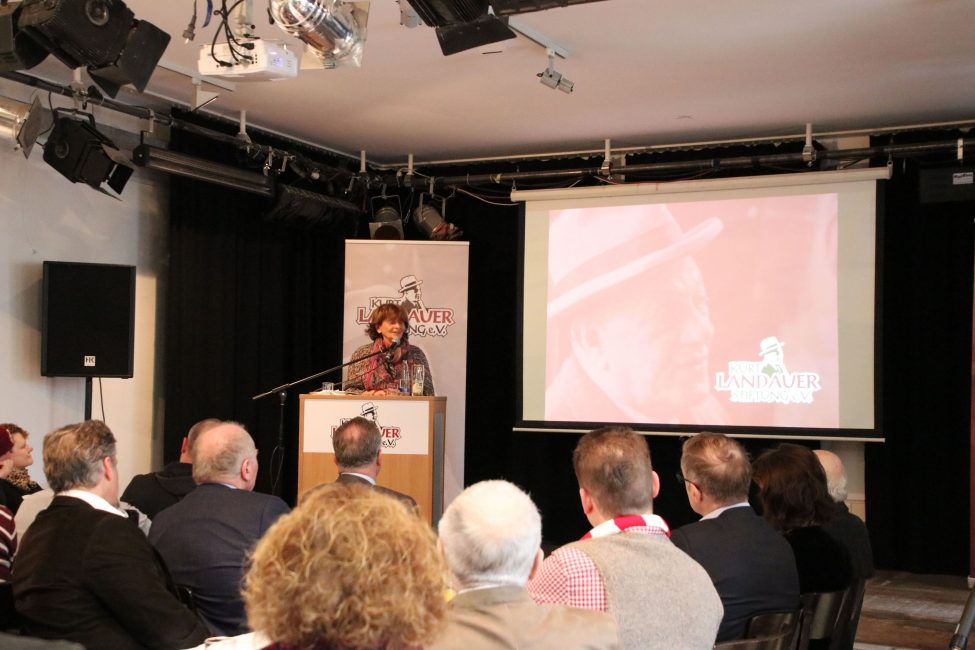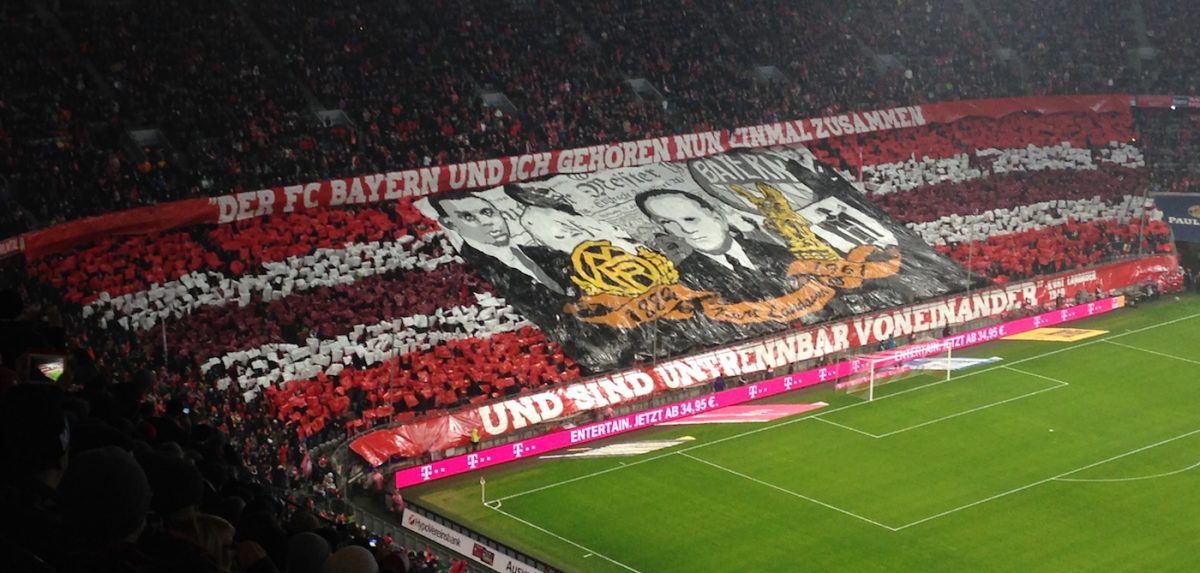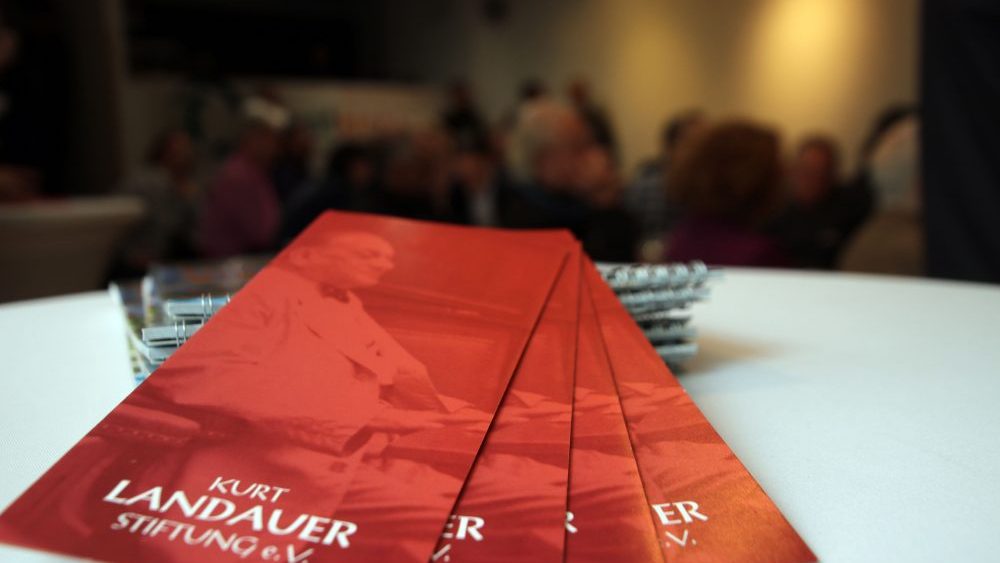Kick it like Kurt – the Kurt Landauer Foundation
When the Munich lawyer Uri Siegel spoke with Die Zeit about his “uncle Kurt and Bayern”, the former Bayern president Kurt Landauer, he had no idea what far-reaching knock-on effects that article would have – certainly he couldn’t have foreseen that he would receive the badge of honour at the founding celebration of the Kurt Landauer Foundation in December, a day before the anniversary of his uncle’s death.
It wasn’t just Uri Siegel who was a guest of honour at the party; it was a rendezvous of the “Landauer family”, as Simon Müller of the foundation put it so fittingly. Charlotte Knoblock, president of the Jewish Religious Community did the honours on that side of things, while FC Bayern were represented by executives Karl-Heinz Rummenigge and Jan-Christian Dreesen as well as president Uli Hoeneß and former president Willi O. Hoffman.

(Image: ©Kurt-Landauer-Stiftung)
Also in attendance were author and football historian Dietrich Schulze-Marmeling, one of the first to record Kurt Landauer’s story in his books about FC Bayern, as well as Dirk Kämper, author of the ARD television film “Landauer – the president” (discussed on miasanrot by Jolle and the author of this piece), who in 2014 presented Kurt Landauer’s story to a wider public. Countless other institutions were represented, among others the Munich National Socialist Documentation Centre, the Dachau Church of Reconciliation, the Jewish Museum, the Munich fan project, and the intercultural street league “buntkicktgut”.
The illustrious collection of guests reflects the goals and activities that the Kurt Landauer Foundation seeks to set itself to. It sees itself, according to speaker Michael Linninger, as another partner in this network of memorial culture, of social engagement and integrative society, and especially in today’s times an engagement of that type seems particularly important to decisively oppose specific social trends. Here it’s important for the initiators, all of whom stem from Bayern’s fanbase, that the history of the club and the identity of the club are starting points to bring about and strengthen this engagement. With this in mind, the foundation is aimed at Bayern fans from all walks of life, to acquaint them with these topics precisely through passion for the club.
The man who gives his name to the foundation, Kurt Landauer, was already active as a 17-year-old in 1901 as a goalkeeper for FC Bayern’s second team, before he helped decisively to define the club’s history over four terms as president. He was responsible not only for the first German championship in 1932, but also stood for international, open-minded football. Being Jewish, the cosmopolitan was persecuted by the National Socialists, and expelled from his home town of Munich, yet he returned after the end of the second World War, heading up FC Bayern once more and building a solid foundation for the successes to come. In his own words: “FC Bayern and I belong together, after all, and are inseparable from one another.”
The seven members of the foundation see Kurt Landauer as the embodiment of the lively process that the club’s identity and history are to them. The values that Kurt Landauer exemplified both as Bayern’s president and as a human are to lead the work of the foundation, promoting especially “projects furthering a cosmopolitan, progressive, liberal and anti-racist society and peaceful and equal coexistence of all humans, irrespective of nationality, citizenship, ethnic, and cultural background.”
This includes support of the intercultural street football league buntkicktgut, which was sponsored with the highly symbolic sum of 1,900€, as well as an excursion to Auschwitz, initiated by Munich’s fan project, and caring for Kurt Landauer’s grave on the New Israelite Cemetery in Munich.
For their first major project, the foundations has plans to erect a statue of their name sake on Bayern’s training grounds at Säbener Straße in the summer of 2018. After all, Linninger says, it was mostly due to him that the grounds became permanently Bayern’s in 1949: “We want Kurt Landauer to oversee his life’s achievements, figuratively in the meaning of the club with its long history, and literally with the grounds and everything they represent.” The foundation thanks the board of directors and employees at Bayern who support their efforts. Efforts to collect enough donations to sponsor the project, likely to end up in the high five-digit range, are well underway and there’s hope that funds will be sufficient by the club’s founding day, 27 February 2018. The foundation is already in contact with renowned artists and is hoping to publish first drafts to the public soon.
Further projects are planned to preserve the memory of other important persons from the club’s history, as an example, Müller and Linninger named Maria Meissner, who was the “heart and soul of the club” for a long time, and Otto Albert Beer, leader of the youth department at the time of the first German championship, who was murdered by the Nazis in Lithuania in 1941.
Also conceivable are events at the Dachau concentration camp memorial or guided tours of the city which reappraise the history of the club during the Nazi era. In addition, Linninger emphasized that the Kurt Landauer foundation is always open to suggestions and ideas for further activities in the sense of the foundation. Anyone who would like to encourage, donate or get personally involved can contact the foundation via the homepage, social media, or by speaking to the people in charge in the stands.

(Image: ©FelixMendoza)
The establishment of the foundation is a further milestone in the development that was started by an article in German newspaper ZEIT with Uri Siegel, and which hopefully is far from being completed. After members of the Schickeria München group were encouraged to get more closely involved with Kurt Landauer, they launched the annual anti-racist Kurt Landauer Tournament in 2006. Later, Uri Siegel could be recruited for lectures and he was also frequently present at the Kurt Landauer Tournament.
In addition, the engagement led to the realisation of the documentary film “Kick it like Kurt” by the youth department of Munich in 2010, followed by a large choreography in the Südkurve for Landauer’s 125th birthday in 2009 and, five years later, another impressive choreography in honour of Landauer on the occasion of the “Remembrance Day in German Football”, which was honoured by the football magazine 11 FREUNDE as “Fan Act of the Year”. Years of continuous commitment to the rediscovery of the temporarily forgotten Honorary President Kurt Landauer culminated in the German Football Association awarding the Julius Hirsch Prize to Schickeria in 2014. FC Bayern itself was now ready to pay tribute to this important person of its club history and renamed the forecourt of its arena in Fröttmaning to Kurt-Landauer-Platz in 2015.
Meanwhile, the current members of the foundation wondered what to do with the prize money of the Julius Hirsch Prize and then came to the conclusion in 2015 that their previous commitment should be made sustainable in the form of a foundation. The legal form of the foundation uses this prize money as a basis, but the projects are financed almost exclusively by donations. Due to this somewhat more complex construction, it took almost two years until the Kurt Landauer foundation was finally registered with the district court of Munich in late summer 2017. Truly a reason to celebrate, but also a mandate and a challenge for the future.
Yes, Uri Siegel really couldn’t have guessed it all then.
The Kurt Landauer Foundation can be found on its multilingual website (German, English, Italian), as well as on Facebook, Twitter, and Instagram. All information on how to become involved or make a donation can be found there.





